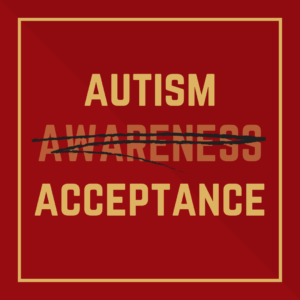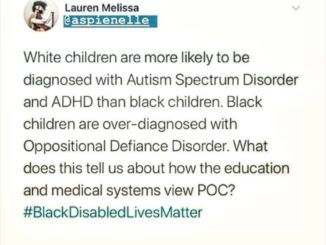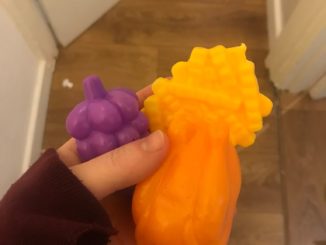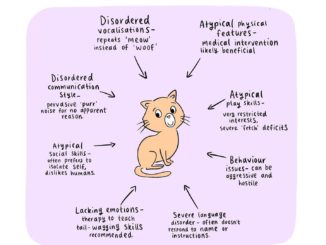Happy April!
You may or may not know this as Autism Awareness Month. There have been campaigns for decades, but growing to prominence with social media culture, about “light it up blue”, the puzzle piece symbol, etc, to make people, well, I guess aware of autism. I have no doubt that on a person to person level, this is often well-meaning. (On an organizational level, the ethicality is a little sketchier, which I’ll delve more into later this month.)

It might be a frame shift for you to recognize that it’s very easy to find out what Autistic people think about these types of initiatives, because we can just ask them. There’s kind of an assumption that able-bodied and/or neurotypical people sometimes fall into without even realizing it, which is that they ought to “speak up for” or “be a voice for” people with disabilities or neurodiverse people…as if, you know, they don’t just have voices themselves.
And part of this, I think, can come from the fact that people often think of autism and instinctively think of kids — maybe a kid they know, maybe a kid they knew when they were a kid, maybe just some nebulous concept of how lots of kids these days are being diagnosed with autism.
There are lots of autistic kids. There are also Autistic adults! There is “autism spectrum disorder” as a diagnosis and there is also a larger Autistic community. Within this community there is by and large a rejection of autism as a disorder or something “wrong”, and an embracing instead of neurodiversity (diversity in different people’s natural, neurological wiring), and also an embracing of a strengths-focused understanding of what autism is and can be.
To someone on the outside, or someone newly wading in, this can feel like a very very complicated topic. To someone who has been steeped in it for months or years from a deficits-based framework, it can feel like a very very threatening topic. To someone who has lived with it their whole life or known about it for a long time, it can feel like an exhausting topic to rehash the basics of for those who are newer along on their acceptance journey.
For these reasons and others, I plan to write a fair bit about it this month. I also plan to boost the things that Autistic adults are saying about themselves. Whether you are brand-new to these ideas or have been aware of them for awhile, there may be something you can learn.
I’ll close with this: rather than the “autism awareness” and its associated symbology that has been placed upon the Autistic community without their input, many prefer instead calling it Autism Acceptance Month. This is why: you’re probably already aware of autism. You might not, or might not have known to, accept it as a difference, as a form of diversity, instead of as a disorder or a flaw.
In that same line of reasoning, rather than blue or puzzle pieces (which can be interpreted as “some piece is missing from you” or “you are a confusing puzzle to have to figure out”), most in the Autistic community have embraced using an infinity symbol to symbolize the broad spectrum of experiences that fall within the umbrella of autism, and the colors red (and the motto “red instead”) or gold (because of Au, the chemical symbol for gold and also the first two letters in Autistic).
You will not see blue or puzzle pieces on this page; they have been experienced as hate speech by many in the Autistic community (again, regardless of the possible well intentions of an individual sharing them).
Happy Autism Acceptance Month!



